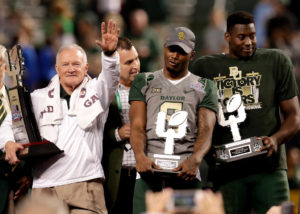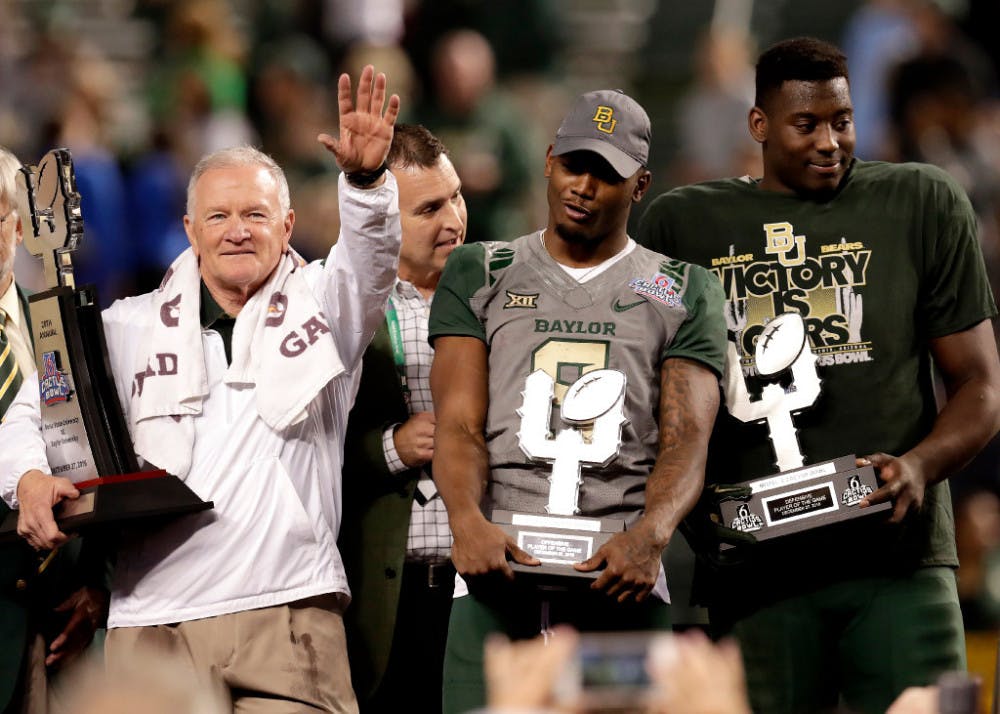By Michael Battista
Staff Writer
Baylor University is currently facing a lawsuit that claims at least 31 Baylor football players committed 52 rapes from 2012 to 2016, according to a federal lawsuit filed on Jan. 27.
A Washington Post article from the same day said the lawsuit included “five gang rapes, two of which involved 10 or more players at the same time, some of whom videotaped the rapes on their phones and passed the recordings around to teammates.”

I’m the type of sports fan who gets critical of punishments directed at sports programs. The idea that an entire group of players, some who came looking to make it big, must suffer when they had no association with the crime usually bothers me.
During the scandal at Penn State University, not only did I feel horrible for the many children who suffered during those decades of abuse, but I also felt for the football players who had to suffer because of Jerry Sandusky’s horrific actions.
The seniors, whose last year it is with the program, would be under sanction with no chance of a postseason. Sure, they could have left, but after playing in a program for three years, it seems like a shame to drop everything and play your last year in a new environment.
Baylor is not going to get that same sympathy as Penn State did. If the news continues to emerge that this disturbing case is true, the NCAA needs to be incredibly swift and harsh in its actions.
It was also reported that the former football coach Art Briles, former Athletic Director Ian McCaw and former President and Chancellor of Baylor University Ken Starr were aware of these heinous crimes and didn’t act on them. Reports from victims claim they reached out to top level personnel in the organization only to be ignored.
Few players were disciplined when accusations aroused, but some were convicted such as former defensive end Tevin Elliot, who was sentenced to 20 years in prison in early 2014 for two counts of sexual assault against a former female Baylor athlete.
Baylor University’s case is a failure and a disgrace that spans not only the program, but deep into the administration of what is arguably one of the nation’s most recognizable schools. This was a despicable culture that was accepted and spread like cancer. If the reports and charges are true, multiple players had to be well aware of the crimes.
The Big 12 announced on Wednesday, Fe b. 8, that it will withhold 25 percent of future revenue payments to Baylor. However, with the university’s recognition in both the academic and college sports world, I fear this may not be enough.
Last semester, I reported on a story regarding players on Harvard University’s men’s soccer team creating vulgar lists that rated players from the women’s soccer team on looks and other sexualized factors. Instead of waiting for the NCAA to possibly step in, the school canceled the team’s remaining games and withdrew them from any postseason play.
I would actually admire Baylor University if it did anything like this. However, since NCAA Division I football is such a lucrative sport, I doubt it would.
The team is also coming off a bowl win last December when it beat Boise State University, 31-12, in the Cactus Bowl.
There is only one thing to do when a program and administration fails this many people, and that is to enact the NCAA death penalty.
Dan Madigan, a writer for the University of Connecticut’s student paper, The Daily Campus, explained in detail in a story from Feb. 9 what the death penalty entails for Baylor.
“The death penalty would mean no competitive football, recruiting or really anything football related other than conditioning for Baylor for one season,” Madigan said. “Players would be allowed to transfer, and scholarships would likely be cut. A multi-year bowl ban could be implemented as well.”
The penalty would be harsher than what Penn State received a few years ago. Regardless, I feel this case is worse. I don’t want to argue that abusing women is worse than abusing children because these actions against any human are incredibly disgusting and heinous.
In Penn State, the sports and college officials failed. The Baylor University players failed, too, and that failure spread through multiple people who could have done something.
The NCAA will be under scrutiny when it announce if it will discipline Baylor further for this incident. If it wants to remain good in the public eye and avoid a Brock Turner incident, the NCAA needs to make a statement.







